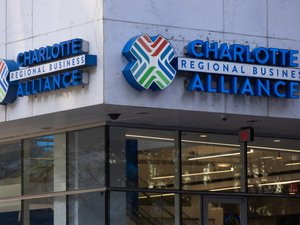
A group of 10 business organizations in North Carolina are urging Congress to implement changes to a federal tax on research and development they say is disrupting innovation among entrepreneurs.
Charlotte Regional Business Alliance is leading the coalition. On Jan. 17, the group sent a letter to North Carolina delegation explaining why the Section 174 "Innovation Tax" on research and development isn't favorable to innovation-related businesses, especially small businesses and startups in that space.
The 10 organizations supporting the policy change include CLT Alliance; Asheville Area Chamber of Commerce; The Chamber, Leading Business in Cabarrus; The Chamber of Catawba County; The Chamber for a Greater Chapel Hill-Carrboro; Greater Durham Chamber of Commerce; Greensboro Chamber of Commerce; Greenville-Pitt County Chamber of Commerce; Wilmington Chamber of Commerce; and Greater Winston-Salem Inc.
“What we heard from smaller businesses, tech-oriented businesses, those that are in the innovation economy in particular, was that this was an impediment to sustaining their growth and their viability here in the market,” Joe Bost, CLT Alliance's chief advocacy officer, said. “And so we said, 'Okay, well then we need to roll up our sleeves and get to work.'”
![Joe Bost[4]](https://media.bizj.us/view/img/12440262/joe-bost4*540xx5184-2916-0-270.jpg)
Enacted in 1954 as part of the Internal Revenue Code, Section 174 was established to eliminate the tax burden of R&D expenditures and to encourage such activity to grow innovation across the nation. Under a provision of the 2017 Tax Cuts and Jobs Act, however, businesses are now required to amortize certain R&D activity expenses over a period of several years.
In 2022, those changes went into effect, with North Carolina and other U.S. businesses no longer able to fully expense R&D costs in the same year they are incurred. That is leaving innovation-centric businesses with large, unanticipated tax bills.
“Research and development tends to be capital intensive,” Bost said. “And so the immediate expensing of that from a tax perspective is going to make it financially viable for them to do it.”
The "innovation tax" affects any taxpaying entity with qualifying R&D costs, including corporations, small businesses, startups, sole proprietorships, partnerships and LLCs, as well as pass-through entities such as S-corporations.
R&D is a large job creator, and not expensing costs in that space over a period of years has likely slowed growth in that area, Bost said.
“I don't think there was ever any intention at the federal level to prohibit this or put roadblocks up for the R&D space, especially in the innovation economy,” Bost said. “But it looks like our federal elected officials are trying to rightsize that.”
On Jan. 16, Congress revealed a $78 billion bipartisan tax deal to extend several tax breaks, including Section 174. The bill would roll the "innovation tax" back to its pre-2017 policy, enabling businesses to deduct R&D costs each year, rather than over a five-year period for U.S. companies.
The 10 North Carolina organizations are calling for the state's U.S. senators such as Thom Tillis to support the tax deal. CLT Alliance said the Section 174 policy change is on track to be included in the tax deal being negotiated between the House and Senate.
“It sounds like the appetite in the Senate is positive,” Bost said. “The House is still a little bit murky as it relates to what Speaker (Mike) Johnson's going to do on the issue, but we feel good about the viability of this happening on the Senate side. We've pushed there and we're going to push again on the House side.”
Bost said it is now a matter of “how soon or not” the House takes up the issue. CLT Alliance’s coalition is having conversations regularly with North Carolina House members to try and advance the matter.
“Our conversations with our congressional delegation, they've all been positive,” Bost said. “So, we're hopeful and optimistic that the consensus that was built between the House and Senate chairs will move forward to make this necessary change.”







